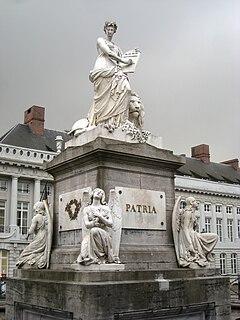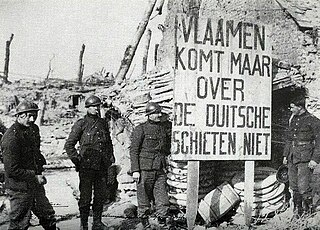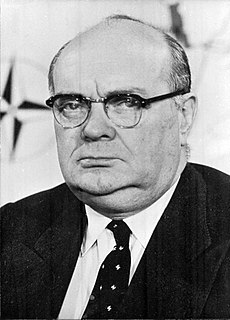
Flemish Brabant is a province of Flanders, one of the three regions of Belgium. It borders on the Belgian provinces of Antwerp, Limburg, Liège, Walloon Brabant, Hainaut and East Flanders. Flemish Brabant also surrounds the Brussels-Capital Region. Its capital is Leuven. It has an area of 2,106 km² which is divided into two administrative districts containing 65 municipalities.

Belgium is a federal state comprising three communities and three regions that are based on four linguistic areas. For each of these subdivision types, the subdivisions together make up the entire country; in other words, the types overlap.

The country of Belgium is divided into three regions. Two of these regions, the Flemish Region or Flanders, and Walloon Region, or Wallonia, are each subdivided into five provinces. The third region, the Brussels-Capital Region, is not divided into provinces, as it was originally only a small part of a province itself.

The Parliament of the Walloon Region, which brands itself as the Parliament of Wallonia and previously as the Walloon Parliament, is the legislative body of the Walloon Region (Wallonia), one of the three self-governing regions of Belgium. The parliament building, the former Hospice Saint-Gilles, is situated in Namur, the capital of Wallonia, at the symbolic confluence of the Meuse and the Sambre, the two main rivers of the most inhabited parts of Wallonia, the Sillon industriel. On the other side of the Meuse, facing the Parliament, is the Élysette, the seat of the Walloon government.

The Flemish Region is one of the three regions of the Kingdom of Belgium—alongside the Walloon Region and the Brussels-Capital Region. Colloquially, it is usually simply referred to as Flanders. It occupies the northern part of Belgium and covers an area of 13,522 km2. It is one of the most densely populated regions of Europe with around 480 inhabitants per square kilometer.

Belgian nationalism, sometimes pejoratively referred to as Belgicism, is a nationalist ideology. In its modern form it favours the reversal of federalism and the creation of a unitary state in Belgium. The ideology advocates reduced or no autonomy for the Flemish Community who constitute Flanders, the French Community of Belgium and the German-speaking Community of Belgium who constitute Wallonia and the Brussels-Capital Region which is inhabited by both Walloons and Flemings, and the dissolution of the regional counterparts of each ethnic group within Belgium.

The area within Belgium known as Brussels-Halle-Vilvoorde encompasses the bilingual Brussels-Capital Region, which coincides with the arrondissement of Brussels-Capital and the surrounding Dutch-speaking area of Halle-Vilvoorde, which in turn coincides with the arrondissement of Halle-Vilvoorde. Halle-Vilvoorde contains several municipalities with language facilities, i.e. municipalities where French-speaking people form a considerable part of the population and therefore have special language rights.

Elections in Belgium are organised for legislative bodies only, and not for executive functions. Direct elections take place for the European Parliament, the bicameral Federal Parliament, the Parliaments of the Communities and Regions, the provincial councils, the municipal councils and a few district councils. Voting is mandatory and all elections use proportional representation which in general requires coalition governments.

Flamenpolitik is the name for certain policies pursued by German authorities occupying Belgium during World War I and World War II. The ultimate goal of these policies was the dissolution of Belgium into separate Walloon and Flemish components.
The Walloon Movement is an umbrella term for all Belgian political movements that either assert the existence of a Walloon identity and of Wallonia and/or defend French culture and language within Belgium, either within the framework of the 1830 Deal or either defending the linguistic rights of French-speakers. The movement began as a defence of the primacy of French but later gained political and socio-economic objectives. In French, the terms wallingantisme and wallingants are also used to describe, sometimes pejoratively, the movement and its activists.

The partition of Belgium is a hypothetical situation which has been discussed by both Belgian and international media envisioning a split of the country along linguistic divisions, with each of the Flemish Community (Flanders) and the French-speaking Community (Wallonia) either becoming independent states or joining, respectively, The Netherlands and France. Both communities currently have a large degree of autonomy within the Belgian federation.

The term State reform in the Belgian context refers to the ongoing process of seeking and finding constitutional and legal solutions to the problems and tensions that exist among the different segments of the Belgian population, mostly between the Dutch-speakers of Flanders and the French-speakers of Wallonia. In general, Belgium has evolved from a unitary state to a federal state with communities, regions, and language areas.
The history of Wallonia, from prehistoric times to the present day, is that of a territory which, since 1970, has approximately coincided with the territory of Wallonia, a federated component of Belgium, which also includes the smaller German-speaking Community of Belgium. Wallonia is the name colloquially given to the Walloon Region. The French word Wallonie comes from the term Wallon, itself coming from Walh. Walh is a very old Germanic word used to refer to a speaker of Celtic or Latin.

The Manifesto for Walloon Culture, was published in Liège on 15 September 1983 and signed by seventy-five "key figures in artistic, journalistic and university circles" of Wallonia.

The Royal Question was a major political crisis in Belgium that lasted from 1945 to 1951, coming to a head between March and August 1950. The "Question" at stake surrounded whether King Leopold III could return to the country and resume his royal role as King of the Belgians amid allegations that his actions during World War II had gone contrary to the provisions of the Belgian Constitution. It was eventually resolved by the abdication of Leopold in favour of his son, Baudouin, in 1951.

Federal elections were held in Belgium on 25 May 2014. All 150 members of the Chamber of Representatives were elected, whereas the Senate was no longer directly elected following the 2011–2012 state reform. These were the first elections held under King Philippe's reign.
The 2019 Belgian regional elections will take place on Sunday 26 May, the same day as the 2019 European Parliament election as well as the Belgian federal election unless snap federal elections are called.






















